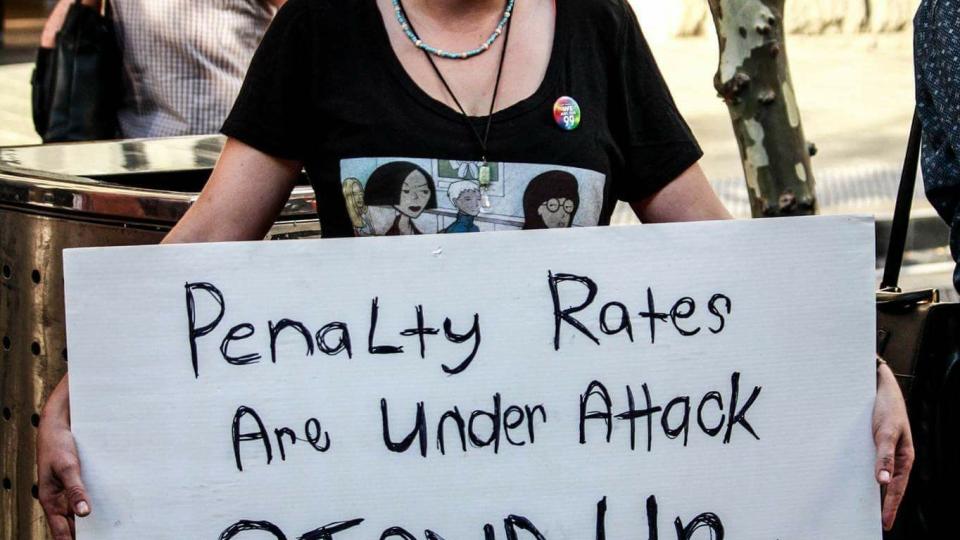Resist Turnbull's war on workers

The recent Fair Work Commission (FWC) decision to cut penalty rates for weekends and public holidays will deliver a windfall to big retail and hospitality bosses, while slashing the wages of about 700,000 low-paid workers.
Figures released by the ACTU put the average worker in accommodation and food services on only $524 a week and those in retail on just $687. Contrast this with the average pay of $1163 for all Australian workers and you can see just how draconian FWC’s decision is.
Already a number of businesses have said publicly that they will continue to pay their employees the full penalty rates on weekends. Consumer boycott appeals have been circulating on social media against retail giants such as Harvey Norman, which stands to save $1 million a year from the penalty rate cuts.
Feeling the pressure, the Council of Small Business has said it favours a transition that allows for the grandfathering of rates for existing employees — a position also being advocated by former Coalition employment minister Eric Abetz.
Clearly, this decision is hugely unpopular and generating a lot of backlash on the government and employers. Let’s keep it up.
Labor and the Greens have responded by seeking to introduce bills calling on the Coalition government to protect the take-home pay of workers.
But the federal government has, so far, used its numbers to scuttle debate on Labor’s bill — The Fair Work Amendment (Repeal of 4 Yearly Reviews and Other Measures) Bill 2017 — which was introduced to the House of Representatives on February 27. The ACTU has launched an online petition, which was signed by more than 65,000 supporters in its first week.
ACTU President Ged Kearney said on February 27 that “Fair Work rules can be changed — the umpire can be given a new set of rules to referee the game. The Prime Minister knows this, but based on his current comments seems more interested in pandering to his big business supporters than in protecting these workers.”
The Age political editor, Michael Gordon, set out a case for government intervention on March 1, writing: “This would involve doing two things. The first would be to introduce legislation to give the Fair Work Commission the power to issue orders to protect the take home pay of those affected.
“The second would be to make a formal submission to the commission, urging it to use this power to effectively apply a no disadvantage test to the landmark decision.”
The attacks on penalty rates follow the government’s reinstatement of the nefarious Australian Building and Construction Commission (ABCC).
The new ABCC, like its predecessor, is an attack on the civil liberties of workers in the construction industry, on their job security, on the rights of construction unions to represent their members and to protect health and safety.
Unions have signalled that they could launch a “Work Choices-style” campaign against the Coalition’s attacks on workers.
The Your Rights at Work campaign against Work Choices contains many valuable lessons for unionists. On the plus side, the campaign was strengthened by the mass mobilisations of workers. However, these protests and actions were not part of the ACTU’s original game plan. Militant unions, starting in Victoria, pushed for and won broad support for a mass street-based campaign.
The ACTU had planned a media campaign, but it was pushed to do more. It was forced for a time to campaign outside of its preferred electoralist focus. But this changed, as the main campaign slogan shifted from “Your Rights at Work: Worth Fighting For” to “Your Rights at Work — Worth VOTING For” in its final stages.
We need a militant and mass campaign if we are going to push the bosses and government back on penalty rates. Already, initiatives are being taken in NSW and elsewhere. On March 9, construction workers and their supporters will be rallying against the Australian Building and Construction Commission (ABCC) across the country.
On March 25, March in March will mobilise communities across the country protesting against the government and this is an important opportunity to unite our forces.
In 2014, about 100,000 people across the country took part in the March in March protests. They were crucial to rejecting former PM Tony Abbott’s austerity budget. As a result, $41 billion in budget bills were tied up in the Senate.
After the Kevin Rudd Labor government rode to victory on the back of the Your Rights at Work campaign, rather than abolish Work Choices, Labor chose to retain many of the anti-worker laws introduced under the John Howard government, rebranded as “Fair Work”.
Rather than disband the ABCC, Labor rebranded it as Fair Work Building and Construction and much of the ABCC’s coercive powers were kept in place. Rather than abolish the notorious Australian Workplace Agreements, they were renamed as Interim Employment Agreements and collective agreements (Enterprise Bargaining Agreements) continued to be undermined as a result.
To protect the rights of workers, the campaign to protect penalty rates has to put the interests of workers at the forefront, and remain politically independent of the Labor Party and the Greens.
Malcolm Turnbull and his ilk need to be kicked out, but workers cannot be satisfied with an end game of simply re-electing a Labor government. Given Labor’s record, unions cannot continue to be beholden to its electoral fortunes: they need to build a campaign that puts the needs of working people, the poor and the vulnerable first.
Ultimately, the only way for workers to effectively resist these attacks and to start to regain the rights that have been lost, is to mobilise their class muscle, to unite in struggle with communities under attack and, through this, start to build the kind of political alternative that puts workers’ rights and the environment above corporate greed.
[Susan Price is a unionist and national co-convenor of the Socialist Alliance.]